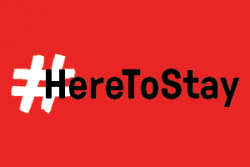Biden drops Trump-era public charge rule appeal!
[caption align="right"] [/caption]
[/caption]Immigrant families can now access life-saving health care, food, and housing assistance for which they are eligible without fear that they will lose the chance to obtain lawful permanent residence, because the harmful Trump public charge rule will again be blocked. The Trump rule erected an invisible wall in the form of a wealth test that discriminated against people on the basis of race as a condition for regularizing their immigration status. This rule invited arbitrary, biased decision-making. And because of the public charge rule, immigrant families have been living in fear of using essential benefits like healthcare, despite serving as frontline workers who have been among those hardest hit by COVID-19. The Biden Administration has rightly withdrawn the government appeals of appellate court decisions in our case, enjoining the Trump DHS’s public charge rule, clearing the way at last for this unlawful rule to no longer be enforced.
For more information on the public charge rule, and to continue reading, go to our website.
It's our 55th anniversary!
This year we are celebrating the 55th anniversary of the Center for Constitutional Rights! We selected March 11 to launch this celebration of our legal and advocacy social justice work because it's the anniversary of the Fannie Lou Hamer filing, one of our first cases. Two of our founders, Morton Stavis and Arthur Kinoy, were among the lawyers who represented her in Hamer v. Campbell, a successful civil rights case Hamer brought against Cecil Campbell, then circuit clerk of Mississippi, for denying her and other Black people the right to register and vote. Fifty-five years later, our mission remains unchanged. Whether we are fighting racial and environmental injustice, gender oppression, or corporate and government abuse, we are still standing with social justice movements and communities under threat — fusing litigation, advocacy, and narrative shifting to dismantle systems of oppression regardless of the risk.
Get the full story on our website.
Gitmo torture survivor asks court to reject Trump bid to deny medical evaluation
[caption align="right"] [/caption]
[/caption]In an unclassified phone call with his lawyer, Guantánamo prisoner Mohammed al Qahtani said:
I feel so much worse. I tried to kill myself again. I was in a state of madness. I don’t know what I did… Even the psychiatrists here told me I’ve reached a stage where I might kill myself without even realizing it.
We are urging a federal judge to deny an effort by the Trump administration in its final days to reverse a court order to convene a panel of medical experts to evaluate Mr. al Qahtani. He is the only person imprisoned at Guantánamo whose torture has been formally admitted to by a U.S. government official, and he suffers from schizophrenia, diagnosed years before his detention, and major depression and post-traumatic stress disorder stemming from his torture.
Read more about Mr. al Qahtani’s case on our website.
It's Sunshine Week - A week of accountability through open records
Sunshine Week (March 14-20) was started by journalists in 2005 to highlight the importance of government transparency and open records laws. The Center for Constitutional Rights Open Records Project, founded two years ago, continues to use the Freedom of Information Act (FOIA) and state open records laws not only to shine a light on secretive government programs, but as a tool in support of our movement partners in their campaigns for accountability and justice. On behalf of a number of incredible partner organizations, such as Austin Sanctuary Network, RISE St. James and No More Deaths, we are litigating several lawsuits demanding information from federal and state agencies across the country.
Sunshine Week is a reminder that open records laws are one avenue toward accountability. In this spirit, the Center for Constitutional Rights recently signed onto a letter from the Knight Institute with dozens of other NGOs asking the Biden administration to prioritize government transparency. We hope we will see faster responses to FOIA requests as well as more robust disclosures so that public records can be an even more effective tool for movements and communities.
CPR slams release of NYPD database that hides the majority of officer misconduct and discipline
Last week, the NYPD released a dashboard that includes limited NYPD officer misconduct and discipline and continues to conceal critical information that can now be made public under the repeal of the police secrecy law 50-a. The database, the contents of which include only information about incidents where the NYPD commissioner has imposed a final guilty finding in administrative charges, does not include what is believed to be the vast majority of misconduct and discipline records, including for racial and other discriminatory profiling, most police sexual abuse, and other misconduct by NYPD officers.
“This is NYPD propaganda, not police transparency or accountability,” said Lumumba Akinwole-Bandele, spokesperson for Communities United for Police Reform (CPR) and Center for Constitutional Rights board member. “This dashboard isn't transparency, it's a shameful bait-and-switch and slap in the face to the tens of thousands of New Yorkers who rallied and marched in defense of Black lives and to repeal 50-a.”
Learn more about the dashboard on our partner CPR’s website and more about the police unions’ lawsuit attempting to roll back the repeal of 50-a in which we intervened on behalf of CPR.

